Must-Sees At The 2010 New York Film Festival (Updated)
There really is no need for an introduction, is there? It’s the New York Film Festival. Those four words say everything. Simply sit back, relax, and bask in the glory of all those Cannes/Venice entries that you’ve been waiting impatiently to see for the past several months/weeks. The air is cooling, autumn is coming, and the 48th NYFF is here.
Note: As with last year, rather than providing comprehensive coverage, we’ve decided to focus on those films that we think are especially strong in some way, shape, or form. We should also acknowledge that we unfortunately haven’t seen every film in this year’s program. Shame on us, we know.
FRIDAY, SEPTEMBER 24th
The Social Network (USA, David Fincher, 120m, 6pm and 9pm) — Read Tom Hall’s review of this film, please, for an interpretation that I haven’t encountered anywhere else yet and with which I wholeheartedly concur. (Michael Tully)
SATURDAY, SEPTEMBER 25th
 Poetry (South Korea, Lee Chang-dong, 139m, 11:30am) — Mija (Yun Jung-hee) is a 66-year-old woman scraping by on her pension and her part-time earnings as a maid. She’s raising her sullen teenage grandson alone—her daughter, the boy’s mother, lives and works in another city. Although Mija’s memory is beginning to give her trouble and strange pains are afflicting her, she joins a poetry-writing class: a beautiful woman, elegant in dress and bearing, she now wants to learn how to create beauty in words as well. But even as she studies the names of flowers and contemplates the gradations of color in an apple’s surface, she finds herself pulled into the orbit of a horrific crime and forced to wrestle with an intolerable moral dilemma. Lee (Oasis, Secret Sunshine), a storyteller of remarkable power and fluency, packs his tale with startling plot twists and sudden eruptions of deep feeling. Poetry is as ethereal and delicate as a snowflake one moment, as brutal as an autopsy the next—an ever-shifting, ever-surprising wonder. (Nelson Kim)
Poetry (South Korea, Lee Chang-dong, 139m, 11:30am) — Mija (Yun Jung-hee) is a 66-year-old woman scraping by on her pension and her part-time earnings as a maid. She’s raising her sullen teenage grandson alone—her daughter, the boy’s mother, lives and works in another city. Although Mija’s memory is beginning to give her trouble and strange pains are afflicting her, she joins a poetry-writing class: a beautiful woman, elegant in dress and bearing, she now wants to learn how to create beauty in words as well. But even as she studies the names of flowers and contemplates the gradations of color in an apple’s surface, she finds herself pulled into the orbit of a horrific crime and forced to wrestle with an intolerable moral dilemma. Lee (Oasis, Secret Sunshine), a storyteller of remarkable power and fluency, packs his tale with startling plot twists and sudden eruptions of deep feeling. Poetry is as ethereal and delicate as a snowflake one moment, as brutal as an autopsy the next—an ever-shifting, ever-surprising wonder. (Nelson Kim)
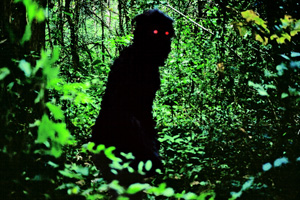 Uncle Boonmee Who Can Recall His Past Lives (UK/Thailand/France/Germany/Spain, Apichatpong Weerasethakul, 113m, 3pm) — Once again, the arrogant elitists who pull the strings at the Cannes Film Festival have shown their contempt for ordinary moviegoers by awarding the Palme d’Or to this plotless, ponderous, and pretentious piece of… Just kidding. Apichatpong’s latest is not only another triumphant addition to what’s shaping up to be a legendary body of work; it’s also probably his most accessible film yet, and thus nicely placed to benefit from the higher visibility and larger audiences the Palme is likely to attract. As usual, there are plentiful allusions to Thai politics and culture that may pass by most non-Thai viewers (though this recent article in the New York Times fills in some useful background), but the dreamy splendors of Uncle Boonmee are open to anyone willing to (a) go with the flow of its relaxed, meditative pace, and (b) believe in magic—specifically, the Buddhist/animist faith shared by most of the film’s characters. Boonmee, a farmer in northeastern Thailand, is dying of kidney disease. In his final days he’s attended to by loved ones—among them, the spirits of his long-dead wife and his long-vanished son. Talking animals, mythological princesses, souls in transit: all are filmed with the same matter-of-fact serenity as the sunlight falling through trees and the crunch of leaves underfoot in the jungle. There won’t be a more beautiful or haunting movie on view this year at NYFF or anywhere else. You will believe. (NK)
Uncle Boonmee Who Can Recall His Past Lives (UK/Thailand/France/Germany/Spain, Apichatpong Weerasethakul, 113m, 3pm) — Once again, the arrogant elitists who pull the strings at the Cannes Film Festival have shown their contempt for ordinary moviegoers by awarding the Palme d’Or to this plotless, ponderous, and pretentious piece of… Just kidding. Apichatpong’s latest is not only another triumphant addition to what’s shaping up to be a legendary body of work; it’s also probably his most accessible film yet, and thus nicely placed to benefit from the higher visibility and larger audiences the Palme is likely to attract. As usual, there are plentiful allusions to Thai politics and culture that may pass by most non-Thai viewers (though this recent article in the New York Times fills in some useful background), but the dreamy splendors of Uncle Boonmee are open to anyone willing to (a) go with the flow of its relaxed, meditative pace, and (b) believe in magic—specifically, the Buddhist/animist faith shared by most of the film’s characters. Boonmee, a farmer in northeastern Thailand, is dying of kidney disease. In his final days he’s attended to by loved ones—among them, the spirits of his long-dead wife and his long-vanished son. Talking animals, mythological princesses, souls in transit: all are filmed with the same matter-of-fact serenity as the sunlight falling through trees and the crunch of leaves underfoot in the jungle. There won’t be a more beautiful or haunting movie on view this year at NYFF or anywhere else. You will believe. (NK)
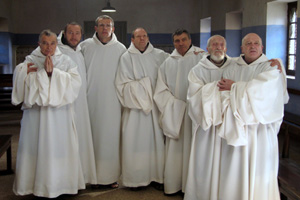 Of Gods And Men (France, Xavier Beauvois, 120m, 6pm) — Based on the true story of a group of French monks who got caught up in the crossfire of the Algerian Civil War of the 1990s, Of Gods And Men is an exquisitely rendered depiction of this profound tragedy. Fearing for their lives and ordered to leave by the Algerian authorities, the monks decide to stick around as a gesture of solidarity with the local population, with whom they’ve become emotionally attached. Yet even these pious men are no match for the violence that surrounds them. Cinematographer Caroline Champetier wields her camera like a paintbrush, capturing the pure, wrinkled faces of Beauvois’s accomplished ensemble cast with nearly spiritual reverence. To be honest, I admired this film more than I loved it, but those heartbreaking faces are impossible to deny. (MT)
Of Gods And Men (France, Xavier Beauvois, 120m, 6pm) — Based on the true story of a group of French monks who got caught up in the crossfire of the Algerian Civil War of the 1990s, Of Gods And Men is an exquisitely rendered depiction of this profound tragedy. Fearing for their lives and ordered to leave by the Algerian authorities, the monks decide to stick around as a gesture of solidarity with the local population, with whom they’ve become emotionally attached. Yet even these pious men are no match for the violence that surrounds them. Cinematographer Caroline Champetier wields her camera like a paintbrush, capturing the pure, wrinkled faces of Beauvois’s accomplished ensemble cast with nearly spiritual reverence. To be honest, I admired this film more than I loved it, but those heartbreaking faces are impossible to deny. (MT)
SUNDAY, SEPTEMBER 26th
Le Quattro Volte (Italy/Germany/France, Michelangelo Frammartino, 88m, 3pm) — Sometimes, when one encounters indescribable magic on film, it makes otherwise heavenly footage seem downright earthly. Such is the case with Frammartino’s Le Quattro Volte. In any other context, three of these segments would feel utterly superb; yet compared to the film’s towering second section, the rest just can’t compete. Actually, if you were to take the last shot of that first segment, a one-take tour-de-force that is worth the price of admission alone, and combine it with the entire second section in which a baby goat is born and begins to make his way in the world, I wouldn’t hesitate to bestow upon it “all time great” status. Which isn’t to say that the entire film isn’t something very special. It’s just hard to compete with a baby goat giving the performance of a lifetime. (Thank you, Lorber Films for taking a chance on this film!) (MT)
Poetry (see above, 5:30pm)
Uncle Boonmee Who Can Recall His Past Lives (see above, 9pm)
MONDAY, SEPTEMBER 27th
A Letter to Elia (USA, Martin Scorsese and Kent Jones, 60m, 6:15pm) — On seeing On the Waterfront: “It was if the world I’d come from mattered. The people I knew mattered.” On East of Eden: “I thought that I was alone—that it was just between me and the movie… [I had the feeling] that the people making the movie knew me maybe better than I knew myself.” As these quotations may indicate, Martin Scorsese’s latest documentary excursion into film history, written and directed with frequent collaborator Kent Jones, is less Marty-as-lecturer, more Marty-as-autobiographer. There are clips aplenty, and a for-beginners summary of Elia Kazan’s life and career achievements, but this is really about what Kazan’s movies meant to Scorsese as a teenage cinephile, and what they’ve come to mean to him now, as a working artist and industry veteran. It’s an intimate and very touching film, and a lovely tribute to a creative role model, former “father figure,” and real-life friend—although, as Scorsese tells us in a typically candid observation, he never got as close to Kazan as he may perhaps have wished, but that’s probably okay: “Maybe you learn more from the work than the man.” A Letter to Elia will be followed by a rare public screening of Kazan’s 1963 immigrant epic, America, America, his own favorite of all his films. (NK)
Of Gods And Men (see above, 9pm)
TUESDAY, SEPTEMBER 28th
Tuesday, After Christmas (Romania, Radu Muntean, 99m, 6pm) — If your marriage or long-term relationship is on the rocks, you might not want to watch Muntean’s domestic tour-de-force, which is as devastatingly honest and realistic a depiction of adultery and a marriage’s subsequent dissolution as you will ever see. Lots of films employ the long-take technique, but in this particular case, Muntean’s decision to let his scenes unfold in this manner proves to be vital to the film’s heartbreaking power. It forces viewers to suffer through this excruciating ordeal in real time without having the comfort of somewhere to hide. Tuesday, After Christmas is a real crusher and one of the year’s very best films. (MT)
Silent Souls (Russia, Aleksai Fedorchenko, 75m, 9:15pm) — A strikingly photographed dream of a film and a poetic requiem for Russia’s dying Merjan culture, Fedorchenko’s Silent Souls follows two men on a journey when one of their wives dies. Even if I found myself pulled out of the movie at some moments (a long one-take of the husband cleaning his wife’s very clearly breathing ‘dead’ naked body?), Silent Souls is suffused with such a genuine sense of haunting and loss that I emerged from it in a hazy daze. (MT)
WEDNESDAY, SEPTEMBER 29th
The Robber (Austria/Germany, Benjamin Heisenberg, 96m, 9:15pm) — The story of an ex-con who can’t resist the temptation to rob banks, The Robber is an entertaining piece of genre fiction that oscillates between contemplative drama and the kinetic thrill of the chase. Based upon the life and crimes of an Austrian marathon runner named Johannes Rettenberger (played with a perfect antiheroic stoicism by Andreas Lust), Heisenberg’s third feature film is a technically beautiful (the movie is shot in CinemaScope and is full of gorgeously muted grays and blues) piece of storytelling that pulls the viewer between moments of extreme tension (a steadicam chase sequence in real time sends the camera hurtling through doors, down staircases and over chain link fences) and mournful regret. The Robber is easily one of the most accessible films at this year’s NYFF; leave your inner snob at home and go have some fun. (Tom Hall)
THURSDAY, SEPTEMBER 30th
Oki’s Movie (South Korea, Hong Sang-soo, 80m, 6pm) —Hong Sang-soo’s kinship with Eric Rohmer is once again on full display in his latest effort, which features another out-of-touch-with-himself male protagonist who ricochets through life acting like a short-circuiting five-year-old. As has become his trademark, Hong once again utilizes the off-kilter narrative technique of telling the same story from different angles; this time, it’s in the form of short films made by his three main characters—one teacher and two students—who recount the story of a love triangle from their own bent perspectives. Hong’s films can sometimes feel like a brazen act of inside baseball, and while that is certainly the case here, at a brisk 80 minutes, Oki’s Song is a light and funny affair that also happens to be laced with genuine bitterness. (MT)
My Joy (Ukraine/Germany/Netherlands, Sergei Loznitsa, 127m, 9pm) — Normally, I like to think of myself as a relatively perceptive viewer who can grasp what’s transpiring in the most challenging of motion pictures. And while I thought that was the case with Sergei Loznitsa’s audacious, at times punishing portrait of life in the Ukraine, boy, was I wrong. In the usual post-press screening discussion with fellow writers, I mentioned Loznitza’s bold narrative decision to abandon the main protagonist, a truck driver, midway through the film, only to instead begin following a somnambulistic stranger with a beard. At that point, the circle got quiet and there were confused looks all around. I was politely informed that the stranger with the beard was the truck driver. Um.. yeah, totally, I knew that. It’s a testament to My Joy (in case you couldn’t figure it out, that title is supremely ironic) that even taking considering this awful misinterpretation on my part, it still impressed me with its numbing, cumulative power. (MT)
FRIDAY, OCTOBER 1st
Tuesday, After Christmas (see above, 3pm)
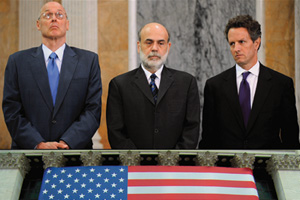 Inside Job (USA, Charles Ferguson, 108m, 6pm) — Just what exactly caused the world’s economy to take a near catastrophic tumble in 2008? Answering that question is the gargantuan task Charles Ferguson has set up for himself with his follow-up to the equally complicated No End In Sight. Yet as he did with that excellent film, Ferguson proves himself to be up for the challenge, delivering a fact-packed, information-stuffed breakdown of events that never collapses under the weight of its own intellect (to wit, even an idiot such as myself could follow along without becoming discombobulated). Woven into this neat, propulsive bundle, Inside Job confirms what I’ve sensed all along, that the main reason I’ve had so much trouble understanding credit swaps and derivatives and this whole economic debacle in general is that it doesn’t make any practical sense. Early on in the film, I felt a huge burst of relief when I realized Ferguson wasn’t turning this into a conservative/liberal issue. But that only led to a deeper, more depressing awareness, that this is a bipartisan issue and when it comes to those who are in positions of power at this very moment, whether they be Republican or Democrat, there appears to be no end in sight. Really uplifting stuff! (MT)
Inside Job (USA, Charles Ferguson, 108m, 6pm) — Just what exactly caused the world’s economy to take a near catastrophic tumble in 2008? Answering that question is the gargantuan task Charles Ferguson has set up for himself with his follow-up to the equally complicated No End In Sight. Yet as he did with that excellent film, Ferguson proves himself to be up for the challenge, delivering a fact-packed, information-stuffed breakdown of events that never collapses under the weight of its own intellect (to wit, even an idiot such as myself could follow along without becoming discombobulated). Woven into this neat, propulsive bundle, Inside Job confirms what I’ve sensed all along, that the main reason I’ve had so much trouble understanding credit swaps and derivatives and this whole economic debacle in general is that it doesn’t make any practical sense. Early on in the film, I felt a huge burst of relief when I realized Ferguson wasn’t turning this into a conservative/liberal issue. But that only led to a deeper, more depressing awareness, that this is a bipartisan issue and when it comes to those who are in positions of power at this very moment, whether they be Republican or Democrat, there appears to be no end in sight. Really uplifting stuff! (MT)
Certified Copy (France/Italy, Abbas Kiarostami, 106m, 9:15pm) — Decades into a career painted over with lavish layers of praise, it seems honest to ask: is there a more humane trickster working in film today than Abbas Kiarostami? Never less than rigorous, preoccupied with the illusions and reproductions in both art and life—art being life and life being art, in his formulation—the Iranian filmmaker who now, like Tarkovsky later in life, works seemingly unsupported by his own country, has used the medium of film (for which he seems to have been born) to humanize The Lie. Certified Copy, then, seems both a return to and sloughing off of form, a cracked-mirror casting-back of hospitable themes (love, pleasure, marriage, reflection) with handsome, sun-swallowing points vanishing in deep background. That the formal elements here are warmer to the touch than those in Through the Olive Trees or Taste of Cherry should cause the opposite of alarm. A putative tale of romance that thrillingly casts off tidy character rationalizations in favor of a far more compelling schematic reality—two apparent strangers slip before our very eyes into the rhythms and discomforts of married life, tied like an anniversary present with wayward glances and irrational outbursts—Certified Copy is, considering the sneak-alarm of its message, shatteringly pleasurable. (John Magary)
***VIEWS FROM THE AVANT-GARDE*** — We can’t vouch for these as we haven’t seen them, but this sidebar always produces some of the festival’s brightest work.
SATURDAY, OCTOBER 2nd
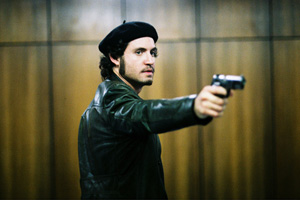 Carlos (France/Germany, Olivier Assayas, 319m, 11am) — Olivier Assayas’s sprawling new French television miniseries Carlos observes a man who could both be easily vilified and mythologized and ultimately does neither. Villainy and mythology are the stock and trade of contemporary political discourse, perhaps dangerously so. In this mostly brilliant five-and-a-half-hour film, Assayas uses his signature loose, sensual style to represent the life of Illych Ramirez Sanchez, the Venezuelan born left-wing mercenary who was behind some of the most daring acts of political terrorism of the 1970s. Reunited with Demonlover DP Denis Lenoir, who bathes scenes in golden light to contrast a palette heavy on deep blues, browns and pale greens, the 50-something director has the opportunity to create an immaculately complex tapestry of European, Middle-Eastern, Asian and Latin American activists, freedom fighters, terrorists, government intelligence agents, Oil ministers, most of whom maintain their fair share of secrets and double agendas. Yet he never loses touch with the intimate portrait of a womanizing ideologue at the center, one whom the audience will be hard pressed to pass swift judgment upon, whose longings to fulfill the need for human intimacy and love come smack up against his own deep moral failings, his womanizing and grandstanding, and the system of international terrorist networks and their sponsor states that uses and ultimately discards him. (Brandon Harris)
Carlos (France/Germany, Olivier Assayas, 319m, 11am) — Olivier Assayas’s sprawling new French television miniseries Carlos observes a man who could both be easily vilified and mythologized and ultimately does neither. Villainy and mythology are the stock and trade of contemporary political discourse, perhaps dangerously so. In this mostly brilliant five-and-a-half-hour film, Assayas uses his signature loose, sensual style to represent the life of Illych Ramirez Sanchez, the Venezuelan born left-wing mercenary who was behind some of the most daring acts of political terrorism of the 1970s. Reunited with Demonlover DP Denis Lenoir, who bathes scenes in golden light to contrast a palette heavy on deep blues, browns and pale greens, the 50-something director has the opportunity to create an immaculately complex tapestry of European, Middle-Eastern, Asian and Latin American activists, freedom fighters, terrorists, government intelligence agents, Oil ministers, most of whom maintain their fair share of secrets and double agendas. Yet he never loses touch with the intimate portrait of a womanizing ideologue at the center, one whom the audience will be hard pressed to pass swift judgment upon, whose longings to fulfill the need for human intimacy and love come smack up against his own deep moral failings, his womanizing and grandstanding, and the system of international terrorist networks and their sponsor states that uses and ultimately discards him. (Brandon Harris)
***VIEWS FROM THE AVANT—GARDE*** (click on the link to find out more)
SUNDAY, OCTOBER 3rd
Certified Copy (see above, 11:30am)
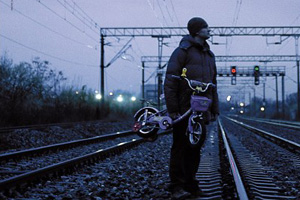 Aurora (Romania/France/Switzerland/Germany, Cristi Puiu, 181m, 5pm) — As usual, Tom Hall gives a great interpretation of this film in his review, though spoilers are contained within (and what is up with that weird comments thread?). While I respect Puiu’s reasons for telling his story in this manner, I confess to still wondering if he needed three hours to tell it (a complaint I normally loathe to hear and/or make). That said, Puiu’s personal, immersive investigation into what makes a certain type of human being tick (spoiler averted!) rewards in so many different ways that it remains recommended viewing. Playing the film’s main character like he’s the Romanian version of the police officer in Bruno Dumont’s Humanite, Puiu puts his body where his brain is, literally going through the motions to try to uncover an explanation for certain deplorable human behaviors. Yet by closing off his emotions and stabilizing his camera, Puiu’s noble exercise made me feel more like I was participating in an act of narcoleptic voyeurism than psychological investigation. (MT)
Aurora (Romania/France/Switzerland/Germany, Cristi Puiu, 181m, 5pm) — As usual, Tom Hall gives a great interpretation of this film in his review, though spoilers are contained within (and what is up with that weird comments thread?). While I respect Puiu’s reasons for telling his story in this manner, I confess to still wondering if he needed three hours to tell it (a complaint I normally loathe to hear and/or make). That said, Puiu’s personal, immersive investigation into what makes a certain type of human being tick (spoiler averted!) rewards in so many different ways that it remains recommended viewing. Playing the film’s main character like he’s the Romanian version of the police officer in Bruno Dumont’s Humanite, Puiu puts his body where his brain is, literally going through the motions to try to uncover an explanation for certain deplorable human behaviors. Yet by closing off his emotions and stabilizing his camera, Puiu’s noble exercise made me feel more like I was participating in an act of narcoleptic voyeurism than psychological investigation. (MT)
The Strange Case of Angelica (Portugal/Spain/France/Brazil, Manoel de Oliveira, 94m, 9pm) — Another wisp of a film from 100-something director de Oliveira, The Strange Case of Angelica casts a truly dreamlike spell. With rich, painterly cinematography and ghostly interludes in which the film’s main character, Isaac, is visited by the deceased young woman he was hired to photograph, de Oliveira brings this otherwise small story to impressively full life. Combine that with a hokey, almost winking sense of humor, and you have another worthy addition to this filmmaker’s ongoing (and ongoing, and ongoing) canon. (MT)
***VIEWS FROM THE AVANT-GARDE***
MONDAY, OCTOBER 4th
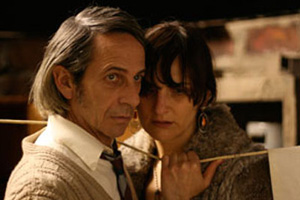 Post Mortem (Chile/Mexico/Germany, Pablo Larraín, 98m) — Pablo Larraín follows up his acclaimed Tony Manero with the same production team, the same lead actor (the brilliant Alfredo Castro), and the same overall mission: to depict the horrors of Chilean life under Pinochet’s military dictatorship. Tony Manero drew most of its considerable power from the stroke-of-genius conception of its main character, a murderous sociopath obsessed with winning a Saturday Night Fever dance-alike contest—a conception that carried rich metaphorical overtones of domestic political violence, the secret history of U.S. foreign policy, the global dominance of American pop culture, and more. Gripping as the film was, the experience of watching it didn’t quite live up to the potency of the idea at its center: for all of Alfredo Castro’s haunted, hangdog grace, I never believed in the character as anything more than a metaphor. But Post Mortem packs a depth charge that shook me to the core, and still has me reeling days later. This time, Castro plays Mario, a lonely middle-aged assistant coroner nursing a crush on his neighbor, a cabaret dancer named Nancy (Antonia Zegers, also excellent). These two damaged souls draw close to each other, but fate intervenes, in the form of the 1973 military coup and the suicide of President Salvador Allende. The last few scenes of Post Mortem build with the remorseless intensity of a nightmare, culminating in a shocking final image of a nation’s hopes being buried under the rubble of history. (Nelson Kim)
Post Mortem (Chile/Mexico/Germany, Pablo Larraín, 98m) — Pablo Larraín follows up his acclaimed Tony Manero with the same production team, the same lead actor (the brilliant Alfredo Castro), and the same overall mission: to depict the horrors of Chilean life under Pinochet’s military dictatorship. Tony Manero drew most of its considerable power from the stroke-of-genius conception of its main character, a murderous sociopath obsessed with winning a Saturday Night Fever dance-alike contest—a conception that carried rich metaphorical overtones of domestic political violence, the secret history of U.S. foreign policy, the global dominance of American pop culture, and more. Gripping as the film was, the experience of watching it didn’t quite live up to the potency of the idea at its center: for all of Alfredo Castro’s haunted, hangdog grace, I never believed in the character as anything more than a metaphor. But Post Mortem packs a depth charge that shook me to the core, and still has me reeling days later. This time, Castro plays Mario, a lonely middle-aged assistant coroner nursing a crush on his neighbor, a cabaret dancer named Nancy (Antonia Zegers, also excellent). These two damaged souls draw close to each other, but fate intervenes, in the form of the 1973 military coup and the suicide of President Salvador Allende. The last few scenes of Post Mortem build with the remorseless intensity of a nightmare, culminating in a shocking final image of a nation’s hopes being buried under the rubble of history. (Nelson Kim)
Boxing Gym (USA, Frederick Wiseman, 91m, 6:15pm) — Frederick Wiseman’s latest is yet more definitive proof that he can 16mm film anything and make it utterly captivating, compelling, and mesmerizing. On the surface, Boxing Gym is a minor entry in the Wiseman catalogue, and not just because it lasts only 90 minutes. In contrast to much of his oeuvre, Boxing Gym is not an overtly biting and unflinching dissection of an American institution. It shares a more similar spirit to his last film, La Danse: The Paris Opera Ballet, as both focus more directly on a group of determined individuals who like pushing their bodies to sweaty extremes. This time, the target is another palace of human exercise—Lord’s Boxing Gym in Austin, Texas—yet contrary to what one might think when one hears the word “boxing,” the members of Richard Lord’s gym span race, age, size, and ethnicity. Credit certainly goes to the amiable Lord for the gym’s all inclusive spirit. As Wiseman cuts back-and-forth between scenes of grueling physical exertion and relaxed conversations between gym members, Boxing Gym becomes a hopeful portrait of America at its most diverse, optimistic, and motivated. (MT)
Inside Job (see above, 9pm)
TUESDAY, OCTOBER 5th
Post Mortem (see above, 9:15pm)
Another Year (UK, Mike Leigh, 129m, 6pm) — Gerri (Ruth Sheen) and Tom (Jim Broadbent), a long-married sixtyish couple, occupy the still center of Mike Leigh’s latest. At first, perhaps, a bit too still—Gerri and Tom are kind, steady, and conscientious middle-class liberals, fine people to have as friends or co-workers or neighbors, but, in the settled regularity of their lives and habits, not terribly promising as movie protagonists. Fortunately, that objection turns out to be somewhat beside the point: what matters isn’t Gerri and Tom’s lives considered in isolation, but their lives considered in contrast to those Leigh sets spinning in motion around them: a bachelor son, a bereaved sibling, a pair of friends down on their luck. The contrasts have to do with those who find happiness and those who don’t, those who can cope handily with the passing of time and those who can’t, and (as Leigh said in a post-press-screening Q&A) those capable of caring for others and those who need others to care for them. Leigh’s humane intelligence, large-souled comedy, and deft ensemble-management skills are all on full display here; he provides a smoothly pleasurable entertainment even as he probes at disappointment and loss. A gem. (Nelson Kim)
WEDNESDAY, OCTOBER 6th
The Strange Case of Angelica (see above, 6pm)
Another Year (see above, 9pm)
FRIDAY, OCTOBER 8th
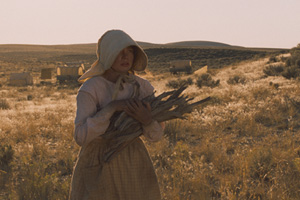 Meek’s Cutoff (USA, Kelly Reichardt, 104m, 6pm) — In reaching deep into the past for her new film—1845 to be exact—Kelly Reichardt’s politically charged vision remains as immediate as ever. Meek’s Cutoff is a breathtaking accomplishment, which proves once again that Reichardt is one of America’s most vital directors (and further confirms that Michelle Williams just keeps getting better and better). The sparse story follows three families who have hired an arrogant guide named Meek (Bruce Greenwood) to lead them over the Cascade Mountains in Oregon. Along the way, they capture a Native American and argue over what to do with him. Gradually, the group’s rising distrust of Meek becomes distrust of one another, until the knowledge that they are very deeply lost begins to sink in. A poetic Western with a deceptively open-ended conclusion (to these eyes, the conclusion is anything but open-ended), Meek’s Cutoff is a transcendent journey. (Michael Tully)
Meek’s Cutoff (USA, Kelly Reichardt, 104m, 6pm) — In reaching deep into the past for her new film—1845 to be exact—Kelly Reichardt’s politically charged vision remains as immediate as ever. Meek’s Cutoff is a breathtaking accomplishment, which proves once again that Reichardt is one of America’s most vital directors (and further confirms that Michelle Williams just keeps getting better and better). The sparse story follows three families who have hired an arrogant guide named Meek (Bruce Greenwood) to lead them over the Cascade Mountains in Oregon. Along the way, they capture a Native American and argue over what to do with him. Gradually, the group’s rising distrust of Meek becomes distrust of one another, until the knowledge that they are very deeply lost begins to sink in. A poetic Western with a deceptively open-ended conclusion (to these eyes, the conclusion is anything but open-ended), Meek’s Cutoff is a transcendent journey. (Michael Tully)
Cameraman: The Life And Work of Jack Cardiff (UK, Craig McCall, 86m, 6:30pm) — While this movie might not qualify as “great cinema,” merely listening to the great cinematographer Jack Cardiff reflect upon his storied career working in England and Hollywood makes this a must-see for anyone with an appreciation for cinema. It’s no wonder so many people wanted to work with Cardiff. Not only was he a charming, affable man, he was a brilliant creative technician who brought anything he touched to much fuller life. On the occasion of its inclusion in this year’s NYFF, audiences get a bonus perk with a two-for-one deal, as Cameraman screens along with A Matter of Life and Death, Cardiff’s first groundbreaking collaboration with Michael Powell and Emeric Pressburger. (Michael Tully)
SATURDAY, OCTOBER 9th
Meek’s Cutoff (see above, 11:30am)
The Autobiography of Nicolae Ceausescu (Romania, Andrei Ujica, 180m, 11:30am) — One thing you should know about Andrei Ujica’s epic three-hour documentary about Romanian president Nicolae Caeusescu: the title is ironic. Though you’d have to be missing a screw or two not to figure that out while watching it. Filled with a staggering array of archival footage (most of which appears to be 16mm), we join Ceausescu as he visits the home soil of other countries, welcomes leaders of other countries onto his home soil, visits businesses and construction sites, holds parades (the most incredible of which is a moving sports demonstration that must be seen to be believed), and, of course, plays volleyball? Ujica bookends his film with harsh interrogation footage of the former leader, when the time has come for him to be punished for his sins. The Autobiography of Nicolae Ceausescu is a strangely exhilarating experience. (Michael Tully)
HBO Directors Dialogues: Kelly Reichardt (3:30pm) — In which Kelly Reichardt discusses Meek’s Cutoff, her previous work, and presumably politics.
SUNDAY, OCTOBER 10th
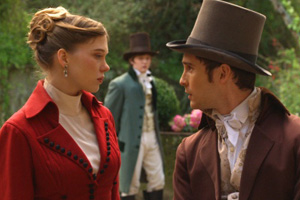 Mysteries of Lisbon (Portugal/France, Raúl Ruiz, 272m, 12pm) — In 19th-century Portugal, João, an orphan being raised in a church-run boarding school, sets out to learn the secret of his parentage. That mystery gets cleared up fairly early on, but the story of João’s parents leads to new stories and new mysteries: the priest who helped save young João, the assassin sent to kill him, the nobleman tricked into a loveless marriage, the noblewoman obsessed with avenging a past hurt—all these lives and many others weave their way in and out of Ruiz’s vast tapestry. The soap-operatic tale, adapted from an 1854 novel by Camilo Castelo Branco, teems with startling revelations and sudden reversals, multiple changes of identity, fortunes gained and lost, dream sequences, flashbacks within flashbacks: a virtual anthology of melodramatic plot devices and narrative flourishes. In nearly every scene, Ruiz knowingly teases us by exaggerating the contrivances, coincidences, and bald-faced implausibilities of the plot and foregrounding the artifice involved in creating this fictional world—and yet, for all his postmodern gamesmanship, he somehow manages to make the whole thing utterly captivating on the level of old-fashioned, what-happens-next storytelling, like a magician showing us how he put his tricks together and enchanting us even more by doing so. The film is nearly five hours long including intermission, but it’s swift and sure-footed from the first scene to the last. (Nelson Kim)
Mysteries of Lisbon (Portugal/France, Raúl Ruiz, 272m, 12pm) — In 19th-century Portugal, João, an orphan being raised in a church-run boarding school, sets out to learn the secret of his parentage. That mystery gets cleared up fairly early on, but the story of João’s parents leads to new stories and new mysteries: the priest who helped save young João, the assassin sent to kill him, the nobleman tricked into a loveless marriage, the noblewoman obsessed with avenging a past hurt—all these lives and many others weave their way in and out of Ruiz’s vast tapestry. The soap-operatic tale, adapted from an 1854 novel by Camilo Castelo Branco, teems with startling revelations and sudden reversals, multiple changes of identity, fortunes gained and lost, dream sequences, flashbacks within flashbacks: a virtual anthology of melodramatic plot devices and narrative flourishes. In nearly every scene, Ruiz knowingly teases us by exaggerating the contrivances, coincidences, and bald-faced implausibilities of the plot and foregrounding the artifice involved in creating this fictional world—and yet, for all his postmodern gamesmanship, he somehow manages to make the whole thing utterly captivating on the level of old-fashioned, what-happens-next storytelling, like a magician showing us how he put his tricks together and enchanting us even more by doing so. The film is nearly five hours long including intermission, but it’s swift and sure-footed from the first scene to the last. (Nelson Kim)








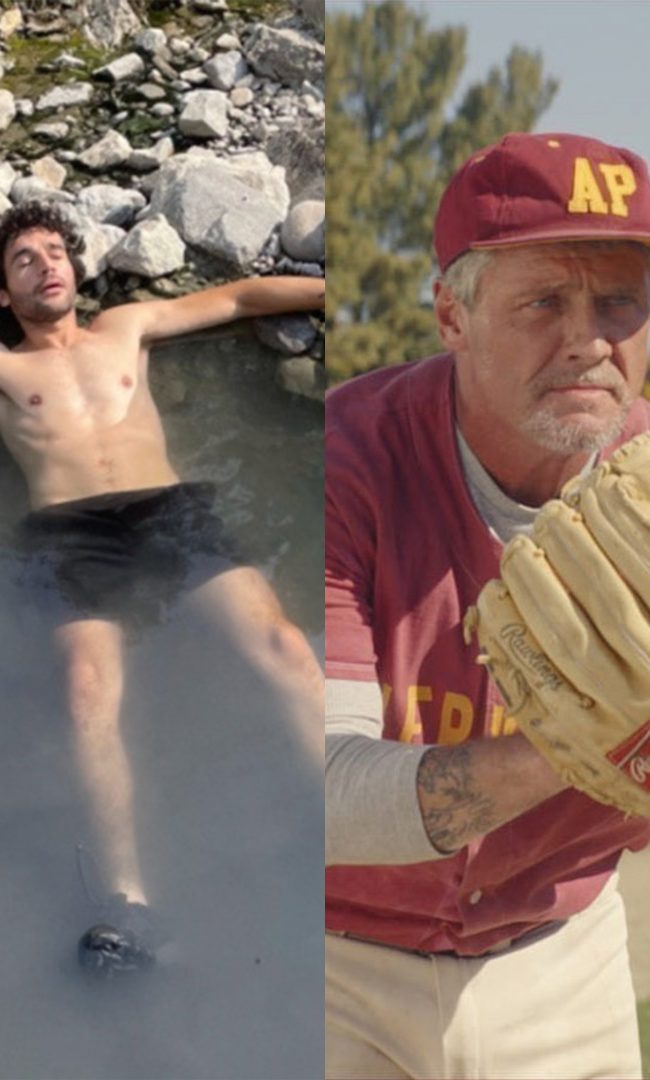
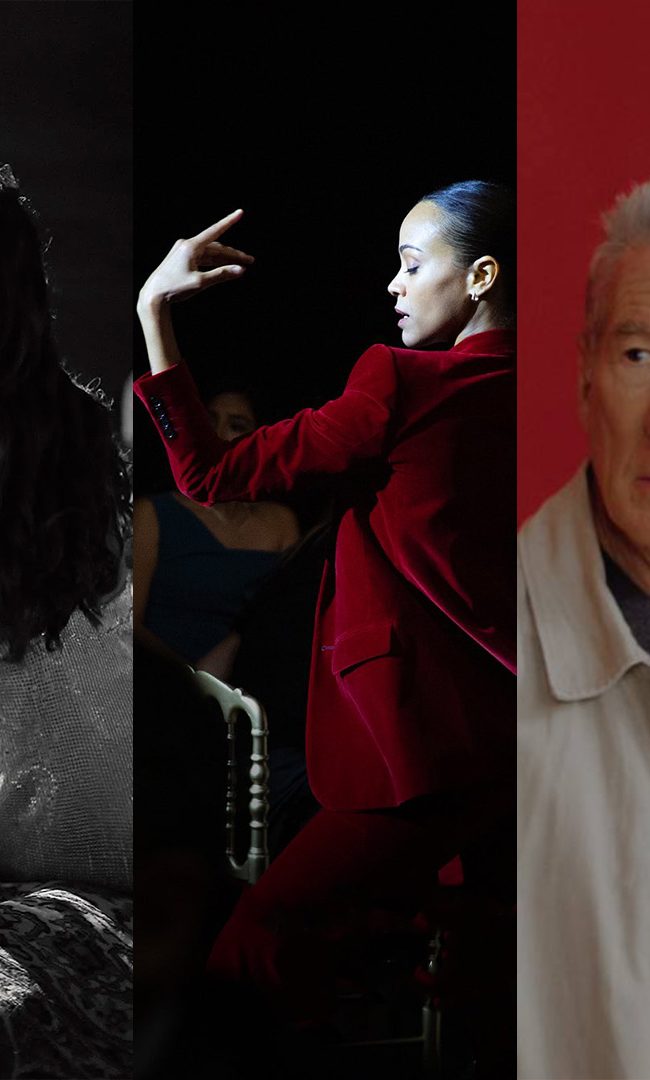


gcgiles
I didn’t know where else to put this, aside from an old NYFF announcement. I just saw Uncle Boonmee at the only theater on the West Coast that seems to want to book this film outside of an overpriced film festival–and at that, only one night, one screening. I read somewhere that this film was shot on 16 mm to capture the feel of Thai television productions Weerasethakul saw as a kid. So it’s softer, grainier, lot’s of dirt around the reel changes (stupid film strip!). Is this true, or just one of those insidious Wikipedia lies? The million-baht question with this film: Is he trying to naturalize folklore and spiritual beliefs–make them mundane, integrated into daily life, demystified–OR is he trying to make them more artificial, like those glowing red LCD monkey ghost eyes, an effect he saw a lot on those television shows? I can trust you guys to give me the goods…
Apropos of nothing, do you delete old comments? Because some of mine are gone, and I wanted to re-experience the glory.
Cheers,
Greg